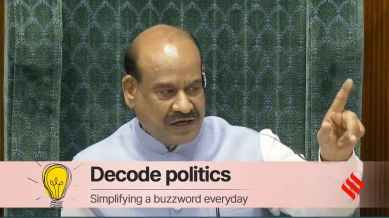Decode Politics: Still no Deputy Speaker, Congress and allies flag in letter to Om Birla
The appointment of a Deputy Speaker is a widely regarded parliamentary convention, with the Opposition holding the post continuously from 1990 to 2014. But the post has been vacant since 2019, Opposition parties point out in a letter to the Speaker.

A day after saying Lok Sabha Leader of Opposition Rahul Gandhi was being “denied” a chance to speak in Parliament, the Congress and its INDIA bloc allies wrote to Speaker Om Birla on Thursday about the ruling BJP’s “violation” of House norms.
In the letter, the delegation of Opposition leaders also raised the issue of the “non-appointment” of Deputy Speaker in the Lok Sabha. Citing Article 93 of the Constitution, which mandates the election of the Speaker and Deputy Speaker in the Lok Sabha, the Opposition leaders pointed out that the Deputy Speaker post has been vacant since 2019.
monthly limit of free stories.
with an Express account.
Right after the Lok Sabha elections last year, the Opposition hoped to get the post of Deputy Speaker due to its strength. The appointment of a Deputy Speaker was a widely regarded parliamentary convention, with the Opposition holding the post continuously from 1990 to 2014. Before that, allies of the Congress, the ruling party, had held the post.
What does the Constitution say about the Deputy Speaker?
According to Article 95(1), the Deputy Speaker performs the duties of the Speaker if the post is vacant. The Deputy Speaker has the same general powers as the Speaker when presiding over the House. All references to the “Speaker” in the Rules are deemed to be references to the Deputy Speaker as well for the times when he or she presides.
Both the Speaker and Deputy Speaker must be appointed “as soon as may be”. Article 93 states that “The House of the People shall, as soon as may be, choose two members of the House to be respectively Speaker and Deputy Speaker”.
Article 178 contains the corresponding provision for the Speakers and Deputy Speakers in the state Assemblies.
Is it mandatory under the Constitution to have a Deputy Speaker?
The Constitution does not specify a time frame for making the appointments. It is this gap in the provision that allows governments to delay or avoid appointing a Deputy Speaker.
However, constitutional experts have pointed out that both Article 93 and Article 178 use the words “shall” and “as soon as may be” – indicating that not only is the election of the Speaker and Deputy Speaker mandatory, it must be held at the earliest.
What are the rules for the election of the Deputy Speaker?
The Speaker and the Deputy Speaker are elected from among the Lok Sabha members by a simple majority of members present and voting.
In the Lok Sabha, the election of Deputy Speaker is governed by Rule 8 of the Rules of Procedure and Conduct of Business in Lok Sabha. According to Rule 8, the election “shall be held on such date as the Speaker may fix”. The Deputy Speaker is elected once a motion proposing his or her name is carried. Once elected, the Deputy Speaker usually continues in office until the dissolution of the House.
Under Article 94 (and Article 179 for state Assemblies), the Speaker or Deputy Speaker “shall vacate his office if he ceases to be a member of the House of the People”. They may also resign (to each other), or “may be removed from office by a resolution of the House of the People passed by a majority of all the then members of the House”.
Has a Deputy Speaker ever had to fill in for an absent Speaker?
After the first Speaker, G V Mavalankar, died in 1956 before his term ended, Deputy Speaker M Ananthasayanam Ayyangar filled in for the remaining tenure of Lok Sabha from 1956 to 1957. Ayyangar was later elected as Speaker of the second Lok Sabha.
After G M C Balayogi of the Telugu Desam Party (TDP), the Speaker in the 13th Lok Sabha, passed away in 2002, Deputy Speaker and Congress MP P M Sayeed became acting Speaker for two months until Manohar Joshi of the Shiv Sena was elected Speaker.
How often has the Opposition held the post?
During the Congress-led UPA-I (2004-09) and UPA-II (2009-14) governments, the Deputy Speaker’s post was with the Opposition, first with Charanjit Singh Atwal of the Shiromani Akali Dal and then Kariya Munda of the BJP.
When Atal Bihari Vajpayee was Prime Minister from 1999 to 2004, P M Sayeed of the Congress held the post. Sayeed was also Deputy Speaker during the short-lived BJP government from 1998 to 1999.
There was no Deputy Speaker during the year-long United Front government led by I K Gujral from 1997 to 1998. Between 1996 and 1997, the BJP’s Suraj Bhan held the post when H D Deve Gowda was Prime Minister.
In the 10th Lok Sabha (1991-96), when P V Narasimha Rao was Prime Minister, S Mallikarjunaiah of the BJP was Deputy Speaker.
When Chandra Shekhar was Prime Minister (1990-91), Shivraj Patil (Congress) served as Deputy Speaker.
AIADMK’s Thambi Durai first became Deputy Speaker in the 8th Lok Sabha (1984-89) when Rajiv Gandhi was Prime Minister. The DMK’s G Lakshmanan held the post from 1980 to 1984 in the Indira Gandhi government. Each of these parties was a Congress ally at the time.
Godey Murahari of the Congress held the post from 1977 to 1979 when the Janata Party government was in power. Between 1969 and 1977, G G Swell of the All Party Hill Leaders Conference served as Deputy Speaker.